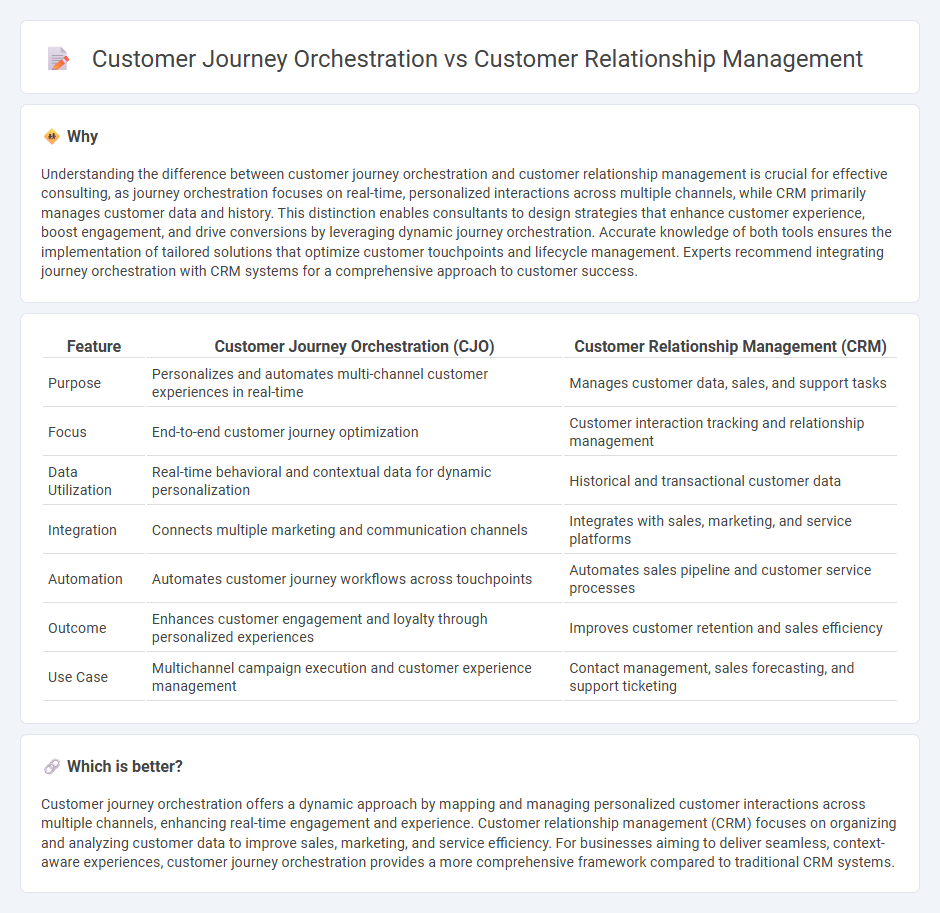
Customer journey orchestration focuses on mapping and optimizing every touchpoint across the entire customer lifecycle to deliver personalized, real-time experiences, while customer relationship management (CRM) centers on managing and analyzing customer data to enhance sales and support processes. Journey orchestration integrates data from multiple channels to predict customer needs proactively, whereas CRM systems primarily store and track customer interactions and history. Explore how combining these strategies can elevate your customer engagement and business outcomes.
Why it is important
Understanding the difference between customer journey orchestration and customer relationship management is crucial for effective consulting, as journey orchestration focuses on real-time, personalized interactions across multiple channels, while CRM primarily manages customer data and history. This distinction enables consultants to design strategies that enhance customer experience, boost engagement, and drive conversions by leveraging dynamic journey orchestration. Accurate knowledge of both tools ensures the implementation of tailored solutions that optimize customer touchpoints and lifecycle management. Experts recommend integrating journey orchestration with CRM systems for a comprehensive approach to customer success.
Comparison Table
| Feature | Customer Journey Orchestration (CJO) | Customer Relationship Management (CRM) |
|---|---|---|
| Purpose | Personalizes and automates multi-channel customer experiences in real-time | Manages customer data, sales, and support tasks |
| Focus | End-to-end customer journey optimization | Customer interaction tracking and relationship management |
| Data Utilization | Real-time behavioral and contextual data for dynamic personalization | Historical and transactional customer data |
| Integration | Connects multiple marketing and communication channels | Integrates with sales, marketing, and service platforms |
| Automation | Automates customer journey workflows across touchpoints | Automates sales pipeline and customer service processes |
| Outcome | Enhances customer engagement and loyalty through personalized experiences | Improves customer retention and sales efficiency |
| Use Case | Multichannel campaign execution and customer experience management | Contact management, sales forecasting, and support ticketing |
Which is better?
Customer journey orchestration offers a dynamic approach by mapping and managing personalized customer interactions across multiple channels, enhancing real-time engagement and experience. Customer relationship management (CRM) focuses on organizing and analyzing customer data to improve sales, marketing, and service efficiency. For businesses aiming to deliver seamless, context-aware experiences, customer journey orchestration provides a more comprehensive framework compared to traditional CRM systems.
Connection
Customer journey orchestration integrates data from customer relationship management (CRM) systems to deliver personalized and timely interactions across multiple touchpoints, enhancing customer engagement and satisfaction. CRM provides a centralized repository of customer profiles, behaviors, and preferences, enabling journey orchestration platforms to map and automate relevant experiences dynamically. This synergy drives improved customer retention, higher conversion rates, and optimized marketing strategies through data-driven insights.
Key Terms
Source and External Links
What is CRM (Customer Relationship Management)? - CRM is the combination of practices, strategies, and technologies companies use to manage and analyze customer interactions and data throughout the customer lifecycle to improve customer service, retention, and sales growth, integrating tools across channels like websites, calls, and social media for real-time data access and decision-making.
customer relationship management (CRM) - CRM is a set of integrated technologies to document, track, and manage relationships and interactions with customers, supporting sales processes, lead management, forecasting, and improving customer retention by analyzing communications and workflows.
What is CRM? - CRM is a comprehensive software system encompassing sales, service, ecommerce, and marketing clouds plus a customer data platform, gathering and analyzing data at every interaction to build a complete customer profile and strengthen relationships, driving sales and customer loyalty.
 dowidth.com
dowidth.com